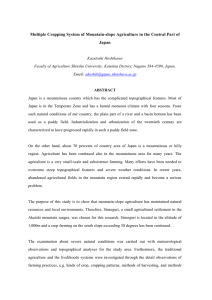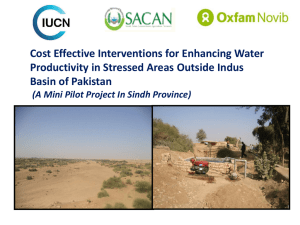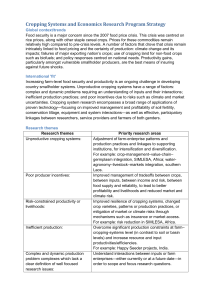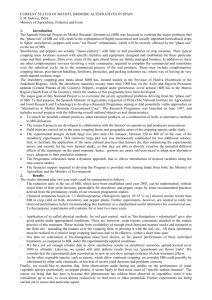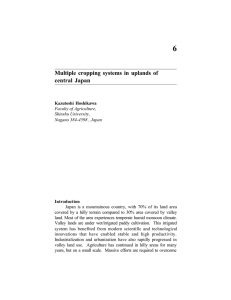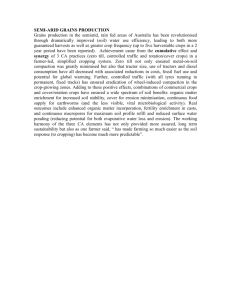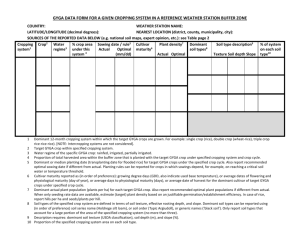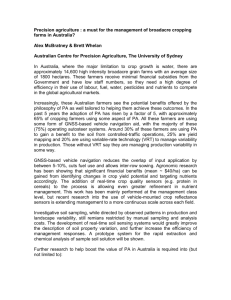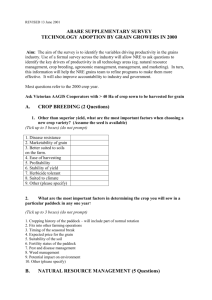Multiple Cropping System of Mountain - Slope Agriculture in the
advertisement
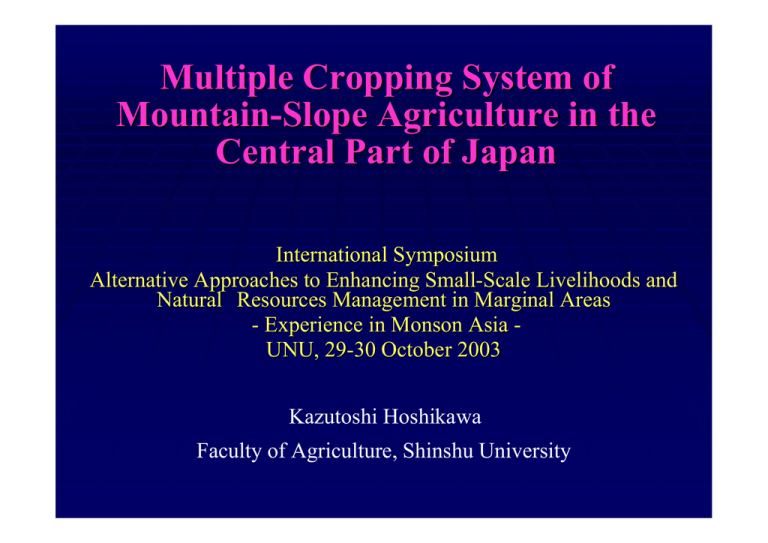
Multiple Cropping System of Mountain-Slope Agriculture in the Central Part of Japan International Symposium Alternative Approaches to Enhancing Small-Scale Livelihoods and Natural Resources Management in Marginal Areas - Experience in Monson Asia UNU, 29-30 October 2003 Kazutoshi Hoshikawa Faculty of Agriculture, Shinshu University Table of Contents 9Background Present conditions of landuse in mountainous region. 9Study area and method Observation of environment and crop farming in study area. 9Highlight data and some discussion Relationships among environment, crop farming and local skills. 9Summary Multiple Cropping System of MountainMountain-Slope Agriculture 2 Background (1) 9 Topographical and meteorological conditions Mountainous country with complex topography Humid monsoon climate with four seasons 9 Agricultural land-use in mountainous region Small in scale, labor intensive and low efficiency Reduction in the number of farmers Increase in an abandoned farmland Multiple Cropping System of MountainMountain-Slope Agriculture 3 Background (2) Not only the abandonment of farmland but also village communities have been simply disappearing as inhabitants grow older. The surrounding abandoned farmlands face the crisis of environmental destruction. To obtain knowledge of traditional agriculture, which has utilized the mountain environment and has harmonized with the condition. To clarify the role and effect of mountain agriculture on environmental conservation and land management. Multiple Cropping System of MountainMountain-Slope Agriculture 4 Study area Kami-mura 9Located on the southern slope in the Akaishi mountain ranges 9Valley of an enclosed system surrounded by the high mountains Multiple Cropping System of MountainMountain-Slope Agriculture Shimoguri 5 Shimoguri: Be reaching up toward the heavens Multiple Cropping System of MountainMountain-Slope Agriculture 6 Outline of Shimoguri 9 Typical small agricultural settlement in Kami-mura, the southern end of Nagano 9 Altitude (m) : 890 ~ 1,100 9 Temperature (℃) : Yearly average 10, max : 31, min: -14 9 Precipitation (mm) : 1900 ~2100 9 58 households and 78 inhabitants (1998) 9 Upland cultivation (No paddy and non use of machinery) 9 Acreage of cultivation by each farmhouse (a) : 21.5 9 Average incline of farmland (deg.): 30 Multiple Cropping System of MountainMountain-Slope Agriculture 7 Harsh environmental conditions Frequent occurrence of a landslide Multiple-cropping on the slopes Multiple Cropping System of MountainMountain-Slope Agriculture 8 Multiple Cropping System of MountainMountain-Slope Agriculture 9 Multiple Cropping System of MountainMountain-Slope Agriculture 10 Multiple Cropping System of MountainMountain-Slope Agriculture 11 Some results of observation 1. 2. 3. Topographical conditions Meteorological conditions Crop farming Multiple Cropping System of MountainMountain-Slope Agriculture 12 -Topographical conditions - Soil erosion and Runoff of topsoil Multiple Cropping System of MountainMountain-Slope Agriculture 13 - Meteorological conditions Table 1. Variations of air temperature (Unit: ℃ observed hourly at 1998) Hourly Daily Yearly mean Max Min Max Min 10.1 24.3 -9.5 31.3 -13.5 Multiple Cropping System of MountainMountain-Slope Agriculture 14 Kind and cultivation period of cultivated crop on sample farm Multiple cropping farm Multiple Cropping System of MountainMountain-Slope Agriculture 15 Land use map of sample farm Wide varieties are grown densely in every location Intensive agricultural landuse Multiple Cropping System of MountainMountain-Slope Agriculture 16 Three features of the agriculture in Shimoguri 9 Small-scale, self-sustaining agriculture 9 Upland agriculture using slope fields 9 Multiple-cropping agriculture Multiple Cropping System of MountainMountain-Slope Agriculture 17 Relationships among environment, crop farming and local skills Environment Crop farming Local skill Multiple Cropping System of MountainMountain-Slope Agriculture 18 Relation among topography, climate and crop farming The temperature near the ground surface almost never falls below zero degree. Multiple Cropping System of MountainMountain-Slope Agriculture 19 Cumulative wisdom and skilled techniques to improve the environment and stabilize crop production Selection of winter crops that grow at low temperature. Preservation and use of traditional crops. Keeping crop-rotation. Adjustment of sowing and harvest time. Keeping the ground warm by covering the soil surface with fallen leaves, plants. Multiple Cropping System of MountainMountain-Slope Agriculture 20 A special harvesting method is used for cultivation of tea Dead leaves and sprouts of tea plats Multiple Cropping System of MountainMountain-Slope Agriculture 21 Relation among soil properties and land management Multiple Cropping System of MountainMountain-Slope Agriculture 22 Soil properties and soil conservation The comparatively large pebbles with gravel mixed in the soil. Half of the soil: large pebbles with a diameter of 1 mm or more The remaining half: fine gravel particles with a well-developed structure. Multiple Cropping System of MountainMountain-Slope Agriculture 23 Special soil properties The large pebbles component decrease the impact of raindrops and help protect against soil erosion. The remaining fine component make a well-structured and fertile soil. Multiple Cropping System of MountainMountain-Slope Agriculture 24 Wisdom and skills for soil conservation and land management Choosing a kind of crop according to topographical and soil conditions. Keeping crop-rotation. Protection of soil erosion by covering the soil surface with fallen leaves and the plants body. Use of various organic fertilizers: leaves, plants, compost. Plowing in the grasses and brushwood. Contour furrowing and farming. Development of own plowing method: “Sakasa Unai”. Installation of the materials which prevents soil erosion. Multiple Cropping System of MountainMountain-Slope Agriculture 25 Contour furrowing and farming Installation of the materials which prevents soil erosion. Use of various organic fertilizers Multiple Cropping System of MountainMountain-Slope Agriculture 26 Contour furrowing and farming. Digging of small pits. Multiple Cropping System of MountainMountain-Slope Agriculture 27 Crop consumption: gastronomic culture Various distinctive recipes for agricultural products. Dengaku from potato Bean paste containing Perilla Buckwheat cakes of salty Pacific saury, Tradition of old gastronomic culture Multiple Cropping System of MountainMountain-Slope Agriculture 28 Potato baked and coated with miso (Imo Dengaku) Multiple Cropping System of MountainMountain-Slope Agriculture 29 Agricultural techniques on multiple cropping system 9Simple and small scale. 9Various and numerous skills of crop and land management have been handed down. 9Traditional skills and farmer’s lifestyles have been intertwined in the study area. 9These compound and integrated skills have a huge role in the conservation of mountain biological resources and land management. Multiple Cropping System of MountainMountain-Slope Agriculture 30 Relationship among environment, skill and crop production Mountain Harsh environment Hard winter Special soil properties Steep slope Small-scale field Skills for soil conservation Skills to improve crop environment Skills to stabilize production Use of mountain Agricultural landuse: weather Crop farming, Land management Mountain resources Multiple crop production Livestock Gastronomic culture (self-consupmtion, self-sufficiency) Multiple Cropping System of MountainMountain-Slope Agriculture 31 Multiple material-recycling system Mountain: closed system Harsh environment Natural resources Land management Farmland Land use Crop farming Production Organic matter Traditional skills Gastronomic culture Crops Community (self-sufficient system) Multiple Cropping System of MountainMountain-Slope Agriculture 32 Summary: Fundamental wisdom in the agriculture of Shimoguri 1.Small-scale, self-sufficient organization based on multiple crop production. 2. Establishment of multiple material-recycling system making the most of local skills relating to the environment, land use, agricultural production and food consumption. 3. Inheriting and maintaining locally developed agricultural skills and gastronomic culture suitable to the area. 4. Acquisition of knowledge relating to environmental conservation of mountains and farmlands through multiple crop farming system. Multiple Cropping System of MountainMountain-Slope Agriculture 33 A small mountain village like Shimoguri indeed mirrors the fundamental paradigm which connects nature and human life. Multiple Cropping System of MountainMountain-Slope Agriculture 34 Thank you very much for your attention Multiple Cropping System of MountainMountain-Slope Agriculture 35
